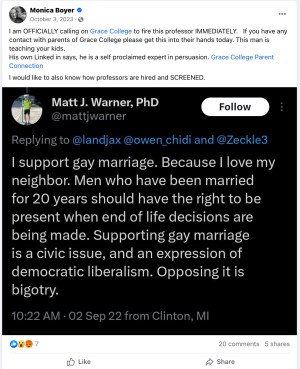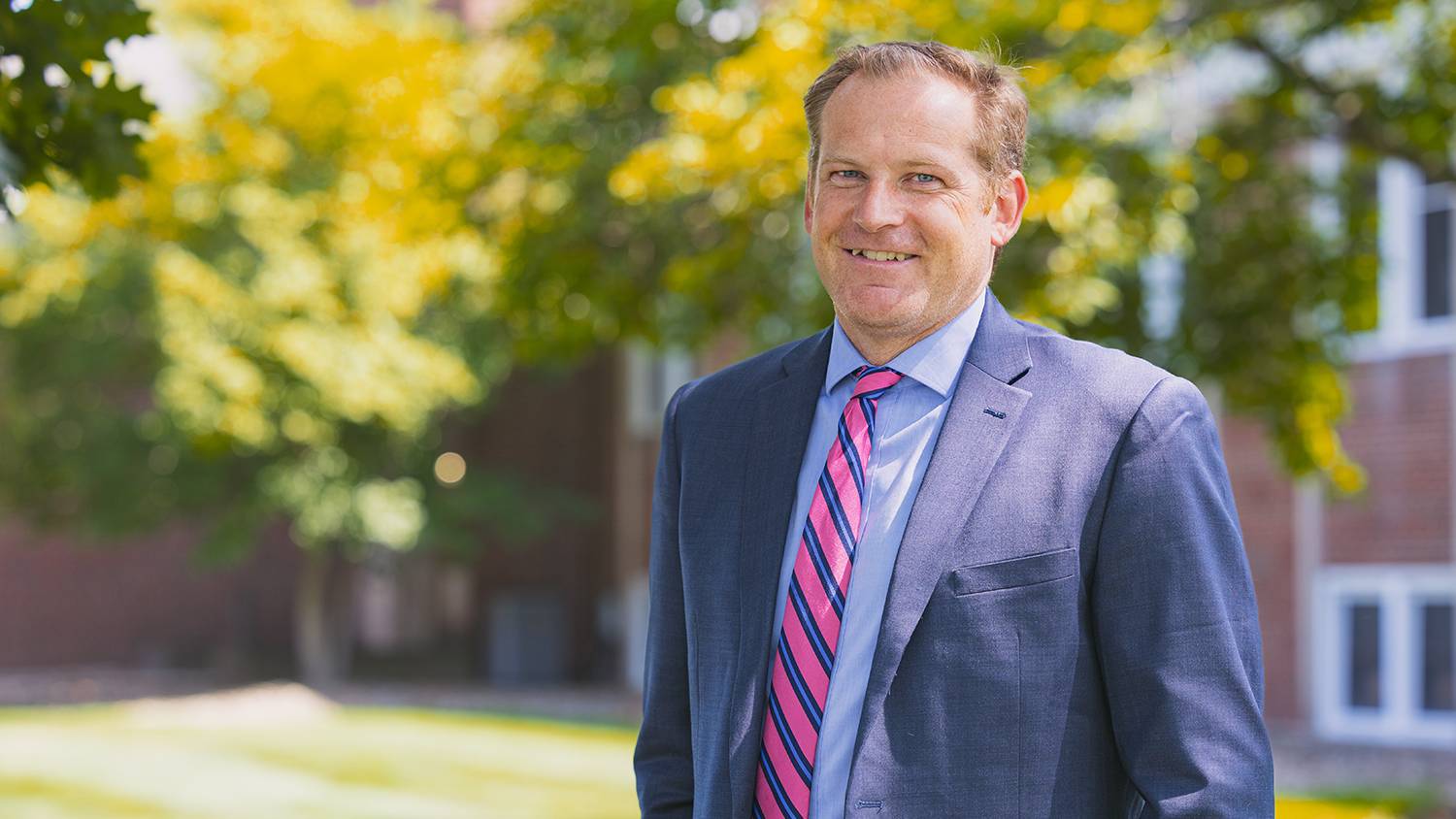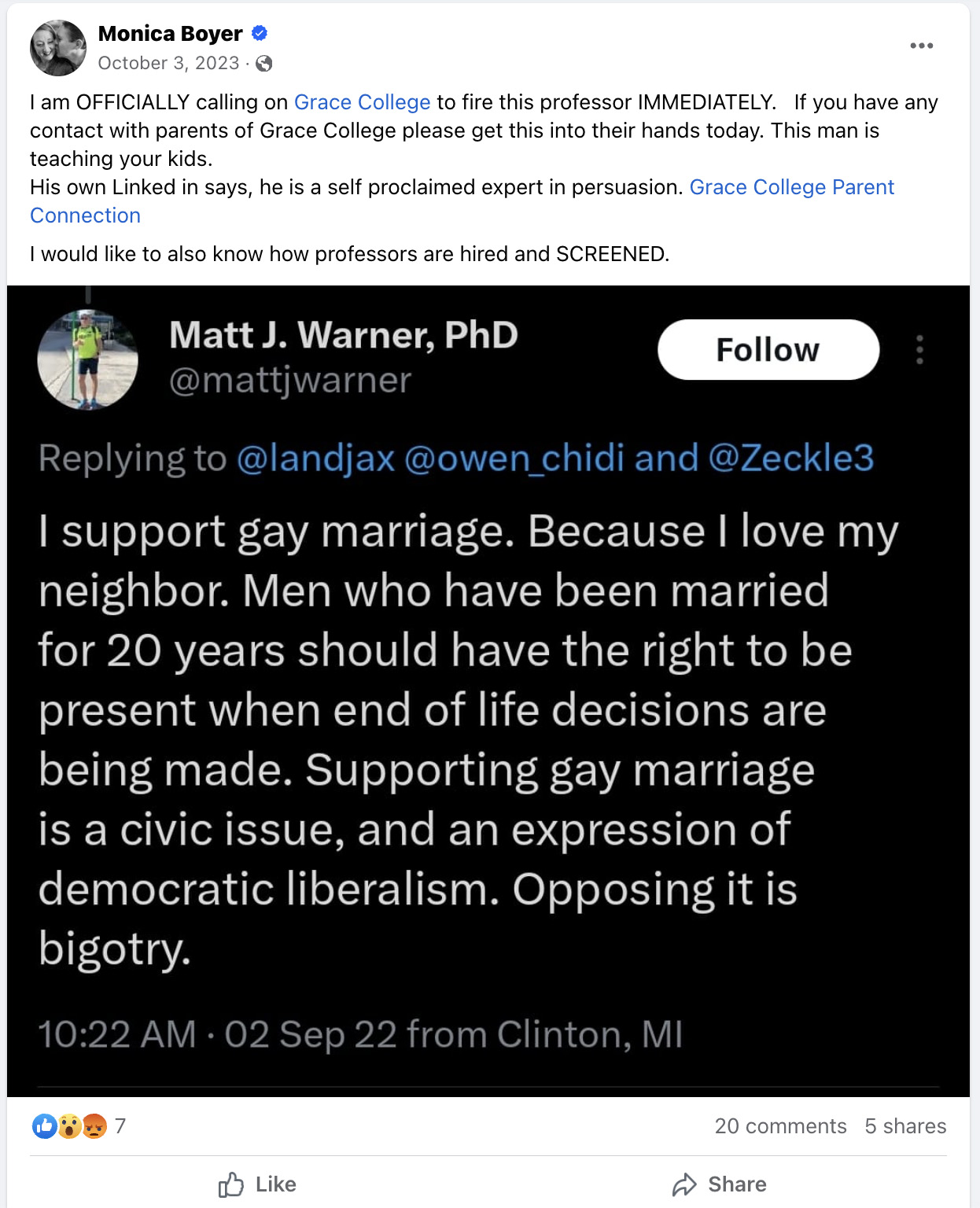With glowing performance reviews and above-average student evaluations, by most measures Matthew Warner’s first year as a communications professor at Grace College was a triumph.
But he spent most of that first year knowing it could be his last. After four months on the job, Warner was informed by the school’s president, Drew Flamm, that the board had “come to the conclusion that we don’t think it works out to move forward,” according to a recording obtained by Religion News Service.
Warner’s termination is the latest in a string of professor terminations at Christian colleges seemingly tied to clashes over narrowing and often unspoken political and theological criteria.
While Flamm didn’t specify the reasons for Warner’s dismissal, it was preceded by an online termination campaign clear about its goals. Launched by conservative influencers and Grace College stakeholders, the campaign demanded Warner’s removal due to his social media posts about LGBTQ rights, Black Lives Matter, and critiques of the GOP. Almost all the posts predated Warner’s employment at the college.
Grace College declined to answer questions about Warner, saying it was a personnel matter. “Dr. Matt Warner fulfilled his agreement for the year. Grace College wishes Dr. Warner well in his future endeavors,” Norm Bakhit, Grace College’s chief officer of human resources, told RNS in a statement. Flamm did not offer further comment.
Warner and his wife said they both left behind jobs and sold their home in metro Detroit to move with their three kids to Warsaw, Indiana, for Warner’s job at Grace. It was his dream position, they said, and noted that they gave up 60 percent of their income for him to take it.
Warner was eager to work with colleagues he described as “world class,” and quickly became known for his interactive teaching style and enthusiastic participation in department events, according to student evaluations and interviews with faculty. Early on, administrators tapped him to be a faculty mentor to first-year students.
 Facebook screengrab
Facebook screengrabThen, in October, Warner learned there was a group of local moms calling for him to be fired. Warner traced the outcry back to a Facebook post by Evan Kilgore, a Grace alum and onetime employee who captured screenshots of Warner’s past tweets, which included such phrases as “I support gay marriage,” “My pronouns are he/they,” “Tucker Carlson is fascist,” and “When Christendom is conservative it ceases to be transformative.”
A former Turning Point USA ambassador and now faith-based political commentator, Kilgore told RNS he posted because “parents might want to be aware of somebody who has influence over their child with these beliefs.”
Kilgore said he was originally tipped off about Warner’s posts by Monica Boyer, a Grace College parent and local political organizer. While Kilgore’s post clarified that he was not calling for Warner’s termination, Boyer took a different approach.
“I am OFFICIALLY calling on Grace College to fire this professor IMMEDIATELY,” Boyer wrote on Facebook. “The devil probably shouldn’t mess with moms who fight for their kids,” she wrote the same day, adding that moms were driving around campus, praying.
Warner proactively met with supervisors as Boyer’s repeated demands gained traction among her nearly 8,000 Facebook followers. But initial conversations weren’t reassuring. Flamm and Bakhit, the chief human resources officer, told Warner he wasn’t yet a faculty member because the board hadn’t ratified him. Now, the board was considering voting against Warner’s ratification, a move that would end his employment.
Warner, who distinguishes between his support of people’s civil rights and his theological convictions, said he had no qualms with the school’s faith standards or lifestyle commitments. Affiliated with Charis Fellowship, a theologically conservative network of churches with roots in German pietism, Grace College requires all faculty to sign a lifestyle commitment that affirms marriage as between one man and one woman and bans homosexual behavior.
“They’ve created a caricature of me based on taking a very small number of social media posts out of context,” Warner said. “I was treated from the beginning as a threat or liability. And nobody at any time had a conversation with me about what I believe, or what I’m willing to do to support the college.”
The news that he wasn’t already a faculty member also came as a shock.
“Most faculty here seemed very surprised to learn that two months after they moved here and started their jobs, they technically were still not employees,” one faculty member, who requested not to be named, told RNS.
In mid-October, Flamm offered Warner the option to voluntarily resign, and, alternatively, outlined a “potential pathway forward” that involved meeting regularly with Flamm and other administrators to restore trust before the board’s ratification vote.
But the “path forward” never materialized, according to Warner, who had emailed Bakhit asking for a breakdown of the process. Bakhit told him there were no specific steps. Warner met with some administrators but not with Flamm.
Things came to a head on December 7, when Flamm told Warner the board had voted not to ratify him. Bakhit offered Warner $60,000 for his voluntary resignation and a confidentiality agreement that included a nondisclosure agreement clause, an offer Warner eventually refused, in part so he could finish out the school year. Though Flamm didn’t provide rationale for the board’s decision, Bakhit told Warner it was due to the “tone and tenor” of his social media posts.
“The fit isn’t because of your theology, the fit is more about … how you’ve come across in the past, and the concern, or the confidence that it wouldn’t happen again in the future,” Bakhit said in a recording obtained by RNS.
Meanwhile, many Grace College employees said they felt in the dark about Warner’s departure.
“It feels like it’s only a matter of time before I or anyone else cross an invisible line we didn’t know was there, and are determined to not be ‘missionally aligned,’” one Grace College employee told RNS.
Cliff Staton, director of Grace College’s school of arts and sciences partnership programs, said he wondered, if Warner didn’t fit at Grace College, did he?
“In a low-trust culture, you start thinking, I must be at risk too,” said Staton. “That was pervasive across faculty. Especially because there was no definitive language around the ‘why.’”
In the spring, students tried to organize a petition and a protest vouching for Warner but were unable to secure the administration’s approval. Students are disappointed in Grace for not saying anything publicly about the situation and “caving to outside pressure,” one student told RNS.
As Christian colleges vie for a dwindling number of incoming students, many are struggling to navigate the chasm between the convictions of conservative stakeholders and those of their more theologically, politically, and racially diverse faculty and student bodies.
In many cases, precarious finances have led schools to prioritize the former. Last year, English professors at Taylor University and Palm Beach Atlantic University were dismissed after receiving alumni, donor, and parental criticism for their teachings on racial justice, though both had been teaching on that topic for over a decade.
Matthew Bonzo, who has taught philosophy at Cornerstone University in Grand Rapids, Michigan, for 26 years, told RNS he was pushed out after refusing to sign an oath of loyalty committing unwavering support to the president and his policies. Even after pushback led to the oath being dropped, Bonzo said he was notified that his position was being eliminated.
Bonzo told RNS he’s seeing many Christian colleges attempt to shield students from conversations about race and gender due to fear of undermining students’ faith.
“The thing that strikes me is the willingness of boards and administration to kind of alter the process to achieve the end that they want,” Bonzo told RNS. “At the very moment when Christian higher ed could be helping to navigate difficult cultural moments, we’ve been sidelined by these kinds of controversies.”
RNS independently confirmed that over 100 employees have departed Cornerstone since the arrival of the current president in 2021. In an email to RNS, the vice president for enrollment said the school has had a strong retention rate of about 81 percent for faculty and staff and has seen a slight increase in enrollment since last year.
At Grace College, those demanding Warner’s removal prevailed. In January, Warner filed a faculty grievance charging Flamm and Bakhit with alleged violations of college policy, but per the college bylaws, the president is the final arbiter of faculty grievances, and Flamm did not find that he or Bakhit had misstepped. Warner also submitted a board appeal requesting that a third party hear his case, but instead, the board affirmed Flamm’s ruling on the grievance.
“Even in all the complexity and hardship of this experience, at all points, he has been on team Grace,” Warner’s pastor, the Rev. Emily Cash, said of him. “His intention was never to show up at Grace to stir the pot, but to love students and engage them in the kind of learning he himself was delighted by. … He wanted, truly, to be at Grace, and for Grace to be a place of grace.”














